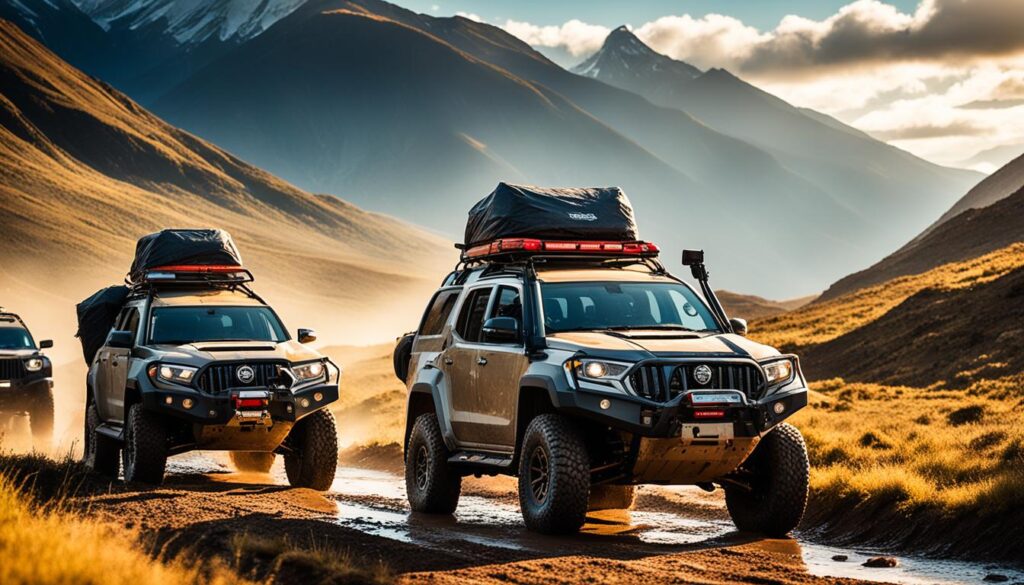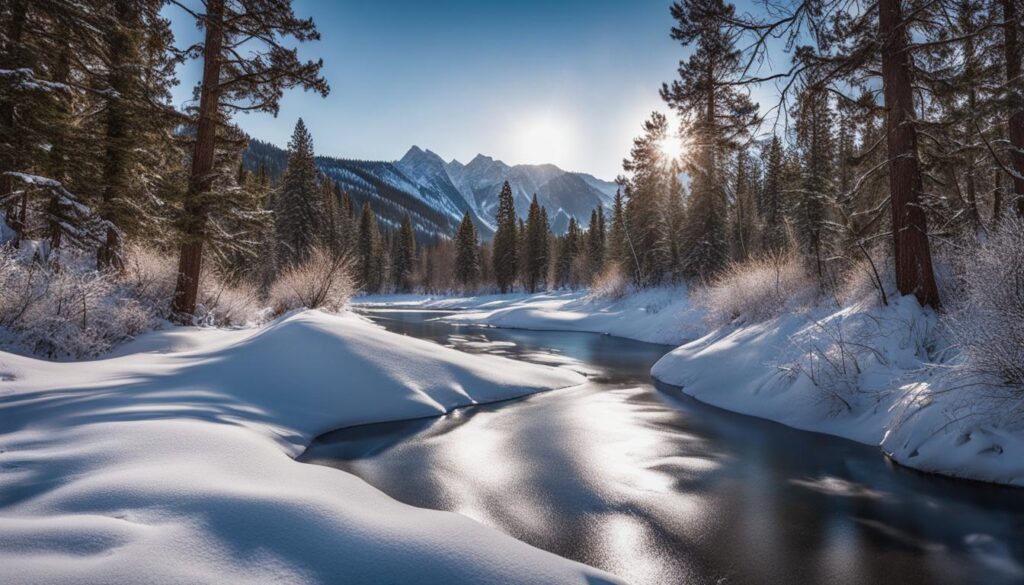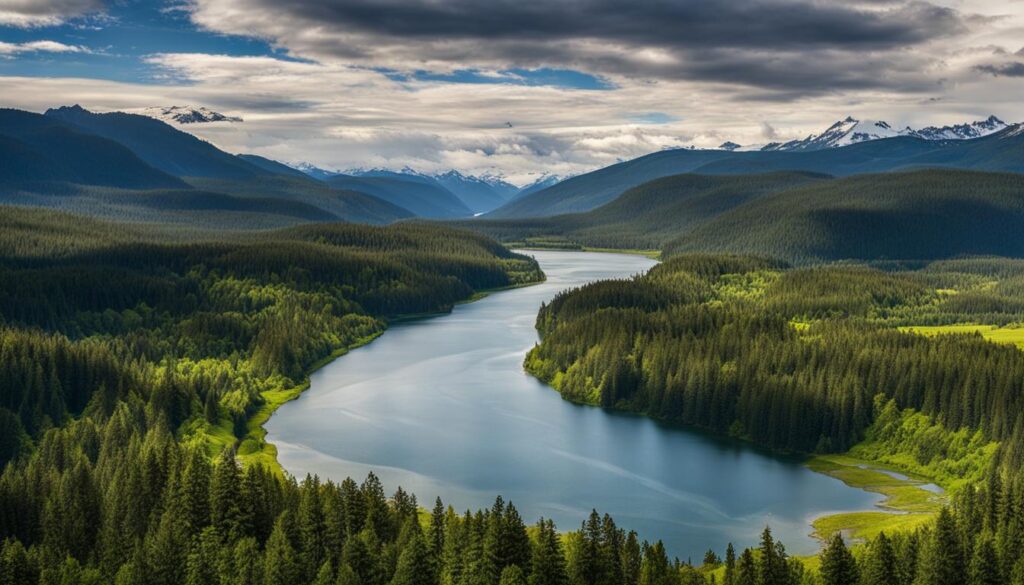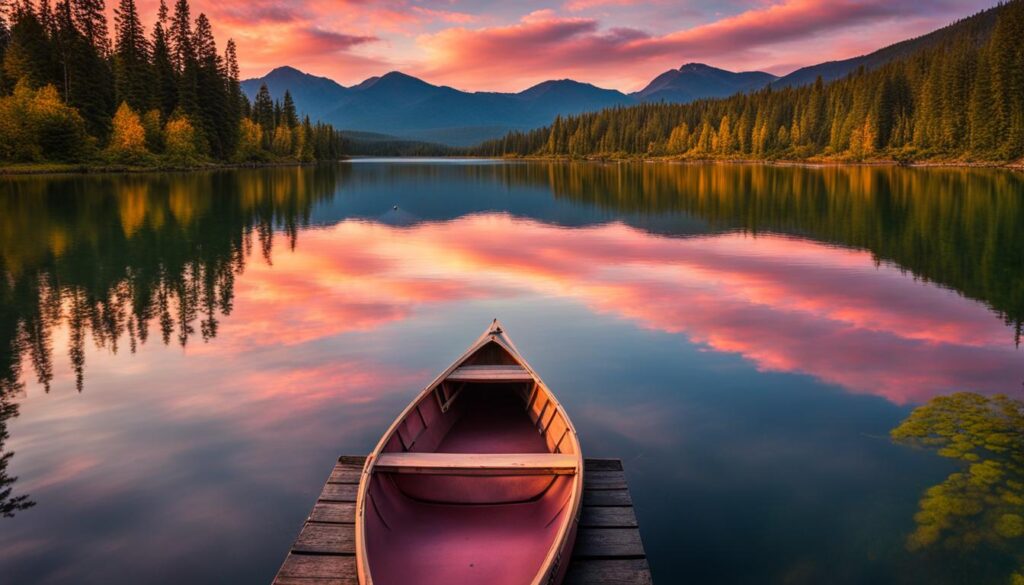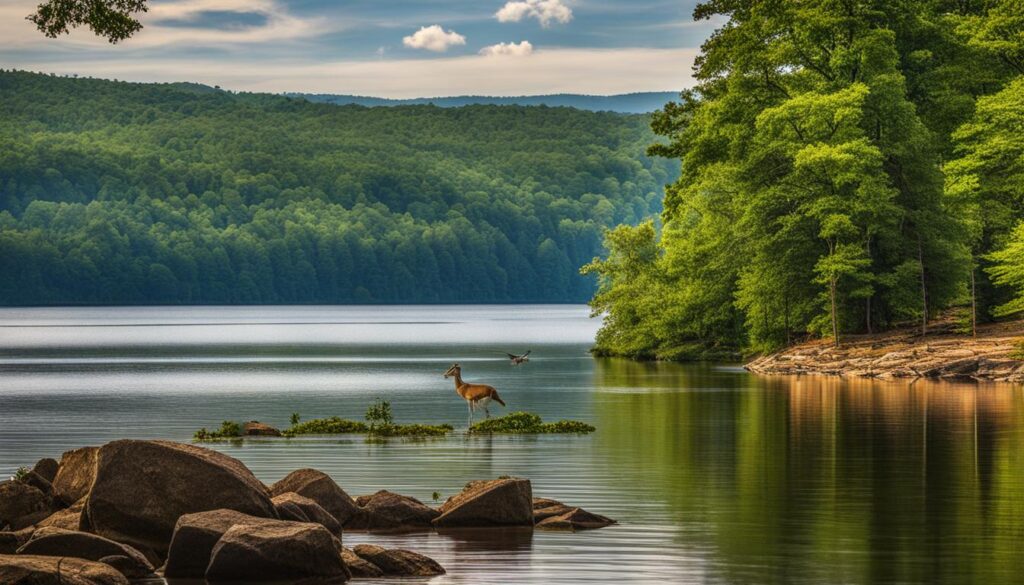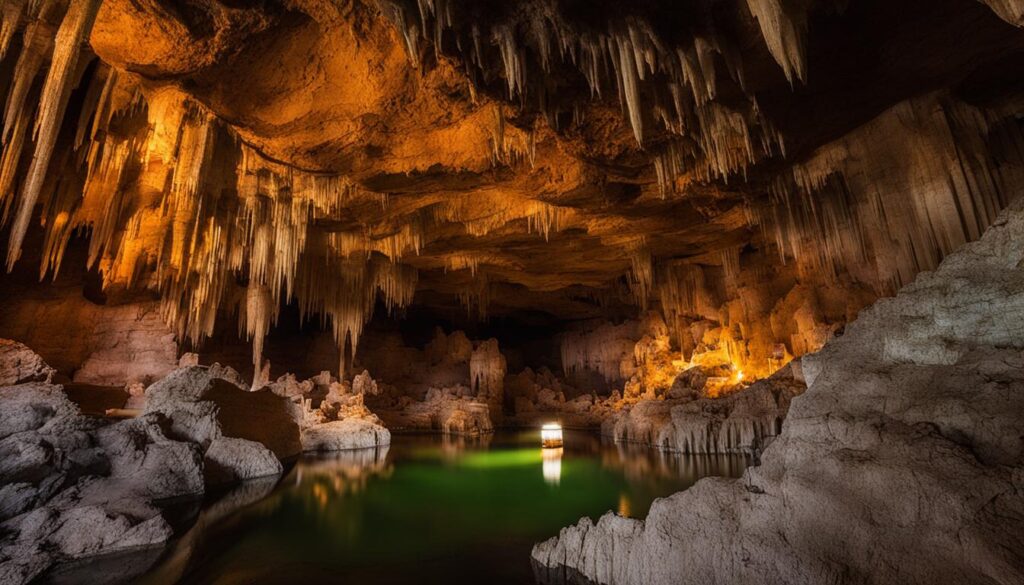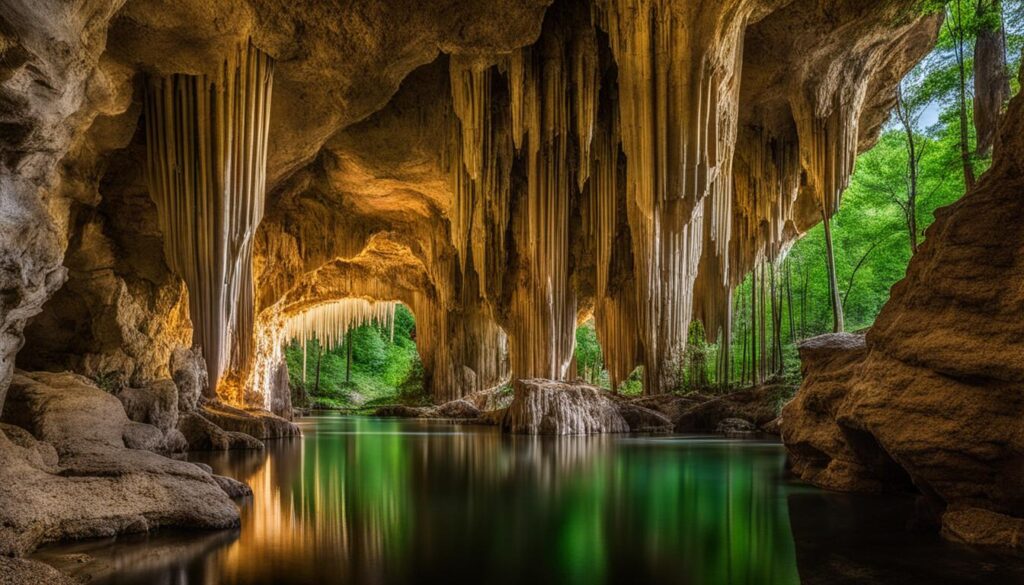Did you know that overlanding is a rapidly growing outdoor activity, with enthusiasts traveling tens of thousands of miles across remote and rugged terrains? It’s not just a simple camping trip or a weekend getaway in nature. Overlanding is a unique and thrilling way to explore the world, embracing the spirit of adventure and self-discovery.
Overlanding has gained immense popularity among outdoor enthusiasts and nature lovers who seek to go beyond the beaten path and immerse themselves in the untamed wilderness. It’s a journey of exploration, where the destination matters less than the experiences and discoveries along the way.
In this article, I will delve into the essence of overlanding, its historical roots, the gear and vehicles needed, the diverse routes you can take, the challenges you may encounter, and the vibrant community and lifestyle that surrounds this adventurous pursuit. Whether you’re an experienced overlander looking for inspiration or a curious beginner eager to embark on your first expedition, this guide will provide you with valuable insights and tips to make the most of your overlanding experience.
Key Takeaways:
- Overlanding is a rapidly growing outdoor activity that involves traveling long distances across remote and rugged terrains.
- It is a unique and thrilling way to explore the wilderness, embracing the spirit of adventure and self-discovery.
- The journey and experiences are more important than the destination in overlanding.
- This guide will provide you with valuable insights and tips for your overlanding adventure.
Contents
- 1 The Essence of Overlanding Adventure
- 2 Historical Roots of Overlanding
- 3 What is Overlanding: The Ultimate Guide to Wilderness Exploration
- 4 Building an Overlander's Rig: Selecting the Best Overlanding Vehicles
- 5 The Essential Overlanding Gear for Every Explorer
- 6 Diverse Overlanding Routes: From Deserts to Mountain Ranges
- 7 Preparing for Overlanding Challenges
- 8 Overlanding Culture: The Community and Lifestyle
- 9 Guidelines for Responsible Overlanding
- 10 Real-life Overlanding Experiences and Stories
- 11 Conclusion
- 12 FAQ
- 13 Source Links
The Essence of Overlanding Adventure
Embarking on an overlanding adventure is more than just a journey; it is an immersive experience that pushes the boundaries of exploration, self-discovery, and the love for the great outdoors. Overlanding combines the thrill of off-road travel with the freedom to explore far-flung destinations, creating a unique sense of adventure like no other.
Defining the Overlanding Phenomenon
Overlanding can be best described as a form of self-reliant travel that prioritizes the journey rather than the destination. It involves traveling long distances, often off the beaten path, in a capable vehicle equipped with all the essentials for survival and comfort. Unlike traditional camping or RV trips, overlanding embraces the spirit of adventure by venturing into remote wilderness, venturing through diverse landscapes, and immersing oneself in nature’s wonders.
The Adventurous Spirit of Overland Travel
The heart of overlanding lies in the ruggedness, unpredictability, and unique challenges that come with exploring untamed environments. Whether conquering treacherous terrains, crossing rivers, or setting up camp beneath star-studded skies, overlanding enthusiasts find joy in conquering obstacles and adapting to the ever-changing landscapes that unfold before them.
Overland travel takes adventurers to breathtaking locations that are rarely accessible by conventional means. It offers an escape from the confines of everyday life by encouraging self-sufficiency, resilience, and a deep connection with nature. From witnessing epic sunsets over the mountains to encountering diverse wildlife in their natural habitats, overland travel brings one closer to the wonders of the world.
Embracing the Journey Beyond the Horizon
Unlike conventional travel, overlanding embraces the element of exploration and the allure of the unknown. It encourages travelers to venture beyond the horizon, to delve into uncharted territories, and to discover hidden gems that lie off the tourist trail.
Overlanding is not about ticking off famous landmarks or seeking luxurious accommodations; it is about embracing the raw beauty of the wilderness, immersing oneself in local cultures, and forging unforgettable memories along the way.
Whether it’s navigating through the vast deserts of Africa, traversing the rugged terrains of the Andes, or winding through dense rainforests, overlanding offers a sense of freedom and discovery like no other.
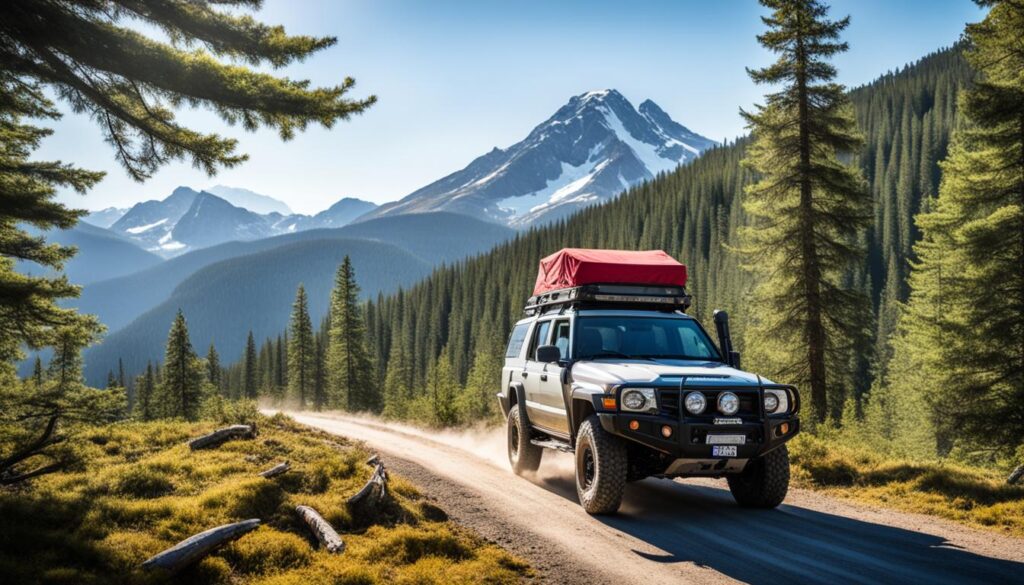
Immerse yourself in the essence of overlanding adventure as we dive into the historical roots, the best gear, the diverse routes, and the incredible stories that shape this remarkable phenomenon.
Historical Roots of Overlanding
Understanding the historical roots of overlanding allows us to appreciate the rich heritage and origins of this captivating adventure pursuit. Overlanding, in its essence, can be traced back to the early expeditions undertaken by explorers and adventurers of the past. These intrepid individuals dared to venture into uncharted territories, unfazed by the challenges and uncertainties that lay ahead.
The spirit of overlanding can be glimpsed in the expeditions of famous travelers like Ernest Shackleton, who undertook daring journeys across Antarctica, and Gertrude Bell, known for her explorations of the Middle East. These pioneers set the stage for generations to come, inspiring a wave of intrepid explorers who sought to discover the world beyond the confines of traditional travel.
“The road to success is always under construction.†– Lily Tomlin
As modern transportation evolved, so did the means by which we venture into the unknown. Overlanding today encompasses a wide range of off-grid adventures, from traversing rugged terrains in 4×4 vehicles to embarking on self-supported long-distance hikes. The essence of overlanding remains unchanged – it is about embracing the journey, immersing oneself in nature, and experiencing the thrill of self-sufficiency.
The historical roots of overlanding serve as a testament to the enduring human spirit of exploration and discovery. By learning from the past, we can appreciate the evolution of overlanding and continue to push the boundaries of what’s possible in our own pursuits of adventure.
What is Overlanding: The Ultimate Guide to Wilderness Exploration
When it comes to escaping the confines of modern civilization and venturing into the wild, overlanding provides the perfect opportunity. Unlike traditional camping, overlanding is not limited to designated campgrounds or defined destinations. It is a true expedition into the unknown, where the journey itself becomes the primary focus.
Overlanding Versus Traditional Camping
While both overlanding and traditional camping involve spending time outdoors and immersing oneself in nature, there are significant differences between the two.
Traditional camping typically involves setting up camp in designated campgrounds that offer amenities like running water, toilets, and electricity. It often revolves around specific locations or attractions and can be limited by the amenities available at the site.
On the other hand, overlanding is about exploring remote and untouched areas, often far away from established campsites. Overlanders embrace the adventure of traveling off the beaten path, seeking solitude and a connection with nature that is unrivaled. They rely on their self-contained vehicles to provide shelter, food, and all the necessary equipment to sustain themselves during their journey.
The Shift from Destination to Discovery
One of the defining characteristics of overlanding is the shift from focusing on the destination to embracing the journey itself. Overlanders prioritize the exploration of wilderness and the discovery of new landscapes, rather than seeking out well-known tourist attractions.
This shift in mindset allows overlanders to forge their own paths and create unique experiences. It is a chance to disconnect from the familiar and immerse oneself in unfamiliar territory, sometimes traversing rugged terrains or crossing challenging landscapes.
Overlanding provides the opportunity to appreciate the beauty of the natural world, from breathtaking mountains to serene lakes and picturesque deserts. It encourages a sense of wonder and appreciation for the diverse landscapes this planet has to offer.
Tips and Tricks for the Novice Overlander
If you’re new to overlanding, here are a few essential tips to help you embark on your first wilderness exploration:
- Invest in a capable and reliable vehicle that is suitable for off-road travel.
- Equip your vehicle with the necessary gear, such as recovery equipment, camping essentials, and navigation tools.
- Research and plan your route beforehand, considering factors like weather conditions, terrain, and available resources.
- Pack efficiently and prioritize essential items, as space in your vehicle will be limited.
- Learn basic outdoor skills, including navigation, first aid, and survival techniques.
- Respect nature and follow leave no trace principles to minimize your impact on the environment.
By following these tips, you’ll be well-prepared for your first overlanding adventure and ready to embrace the freedom and excitement that comes with exploring the wilderness.
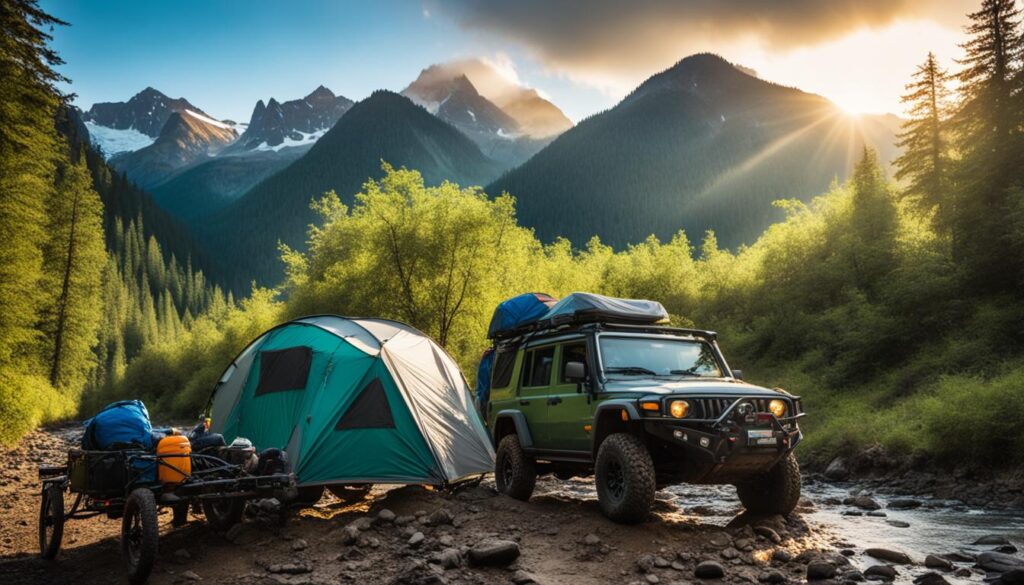
Building an Overlander's Rig: Selecting the Best Overlanding Vehicles
When embarking on an overlanding adventure, one of the most crucial decisions you’ll make is selecting the right vehicle. Your choice of vehicle will determine not only your comfort and safety but also the terrain and challenges you can conquer. To help you make an informed decision, here are some key considerations when building your overlander’s rig:
- Off-Road Capabilities: Look for vehicles with excellent off-road capabilities, including high ground clearance, durable suspension, and four-wheel drive. These features will enable you to navigate challenging terrains effortlessly.
- Reliability: Opt for reputable brands known for manufacturing reliable vehicles. Reliability is crucial on long journeys and in remote areas where assistance may be scarce. You want a vehicle that can withstand the demands of overlanding.
- Storage Space: Overlanding requires ample storage space for all your gear, supplies, and equipment. Look for vehicles with a spacious cargo area or consider adding roof racks or storage systems to accommodate your essentials.
- Fuel Efficiency: Long road trips can be costly in terms of fuel expenses. Therefore, choosing a vehicle with good fuel efficiency will help you maximize your budget and reduce your environmental impact.
- Comfort: Consider the comfort features of the vehicle, such as seating capacity, legroom, climate control, and entertainment options. Remember that you’ll be spending extended periods inside the vehicle, so comfort is essential.
Choosing the best overlanding vehicle is a personal decision that depends on your specific needs, preferences, and budget. Research different models, consult experienced overlanders, and consider test-driving before making your final choice. Remember, your vehicle will be your trusted companion on countless adventures, so choose wisely.
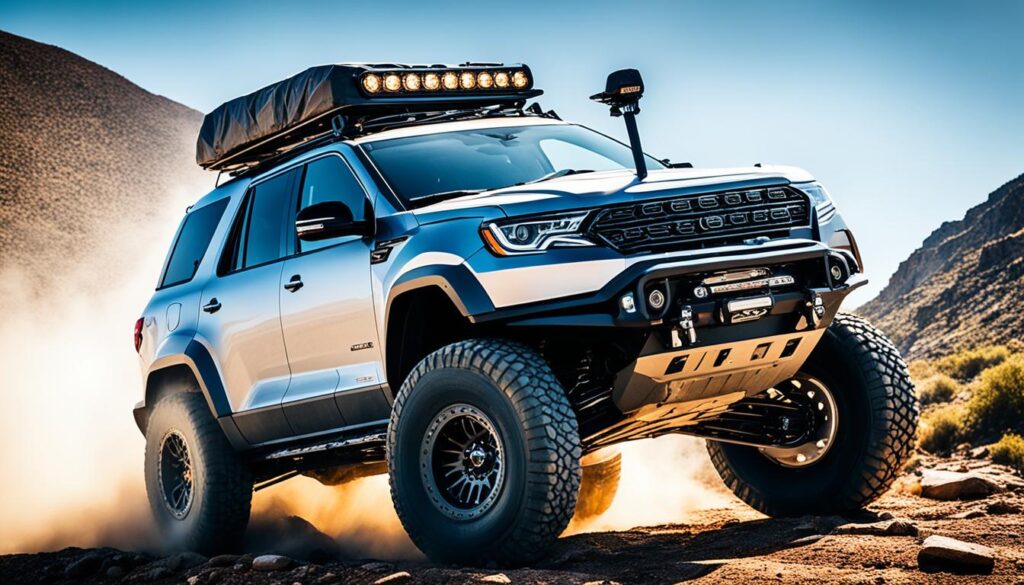
The Essential Overlanding Gear for Every Explorer
When embarking on an overlanding adventure, it is crucial to equip yourself with the necessary gear to ensure a safe and enjoyable journey. From navigation tools to survival kits, having the right equipment can make all the difference in the wilderness. In this section, we will explore the essential gear every explorer should consider before hitting the road.
Navigating Gear Selection: What's Necessary vs. What's Not
With a plethora of gear options available, it can be overwhelming to determine what is truly essential for your overlanding journey. Here are some key items to consider:
- Navigation tools: A reliable GPS device or navigation app on your smartphone will help you stay on track and find your way, especially in remote areas.
- Camping gear: A sturdy tent, sleeping bags, and camping cookware are essential for comfortable nights under the stars.
- Communication devices: In case of emergencies or when venturing off-grid, a two-way radio or satellite phone can be a lifeline for staying connected.
- Recovery gear: Items like tow straps, shackles, and a high-lift jack are crucial for getting unstuck during off-road adventures.
- First aid kit: Be prepared for any minor injuries or medical emergencies with a well-stocked first aid kit.
Packing Smart: Efficiently Utilizing Vehicle Space
When packing for an overlanding trip, space management is key. Here are some tips to make the most of your vehicle’s storage:
- Utilize roof racks or cargo boxes to expand the available space for gear and supplies.
- Invest in storage solutions like drawer systems or cargo organizers to keep everything organized and easily accessible.
- Consider the weight distribution within your vehicle to maintain balance and stability while on the road.
- Opt for multi-purpose gear and collapsible items that save space without compromising functionality.
Survival Kits and Emergency Preparedness
When venturing into the wilderness, preparedness is paramount. Here are some essential items to include in your survival kit:
- Water and water purification supplies: Ensure you have an adequate water supply and the means to purify water from natural sources.
- Food and cooking supplies: Pack non-perishable food items and lightweight cooking utensils to sustain yourself during your journey.
- Emergency shelter: Carry a lightweight tent, tarp, or emergency blanket as a backup shelter option in case of unexpected situations.
- Fire-starting tools: Include waterproof matches, lighters, or fire starters to help you create warmth, cook meals, and signal for help if needed.
- Emergency signaling devices: Carry flares, whistles, or signal mirrors to attract attention in case of emergencies.
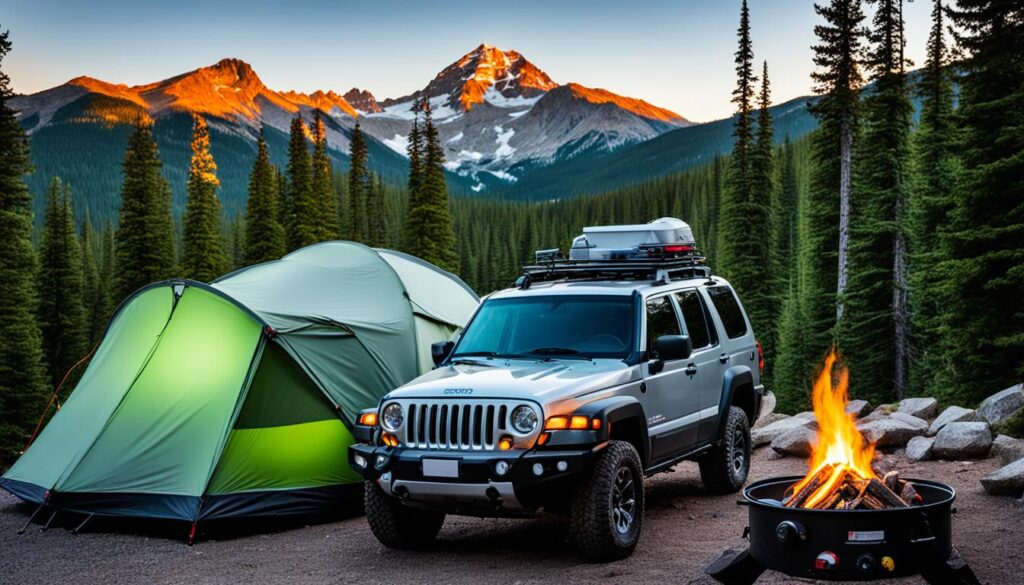
By carefully selecting your gear, efficiently utilizing your vehicle’s space, and securing essential survival items, you can embark on your overlanding adventure with confidence and peace of mind.
Diverse Overlanding Routes: From Deserts to Mountain Ranges
One of the most exciting aspects of overlanding is the wide range of routes and terrains that can be explored. Whether you’re seeking the barren beauty of deserts or the majestic peaks of mountain ranges, there’s a route out there that will satisfy your adventurous spirit.
Overlanding allows you to immerse yourself in diverse landscapes, offering a unique perspective on the natural wonders of the world. From the sandy dunes of the Sahara to the rugged trails of the Rocky Mountains, each route presents its own challenges and rewards.
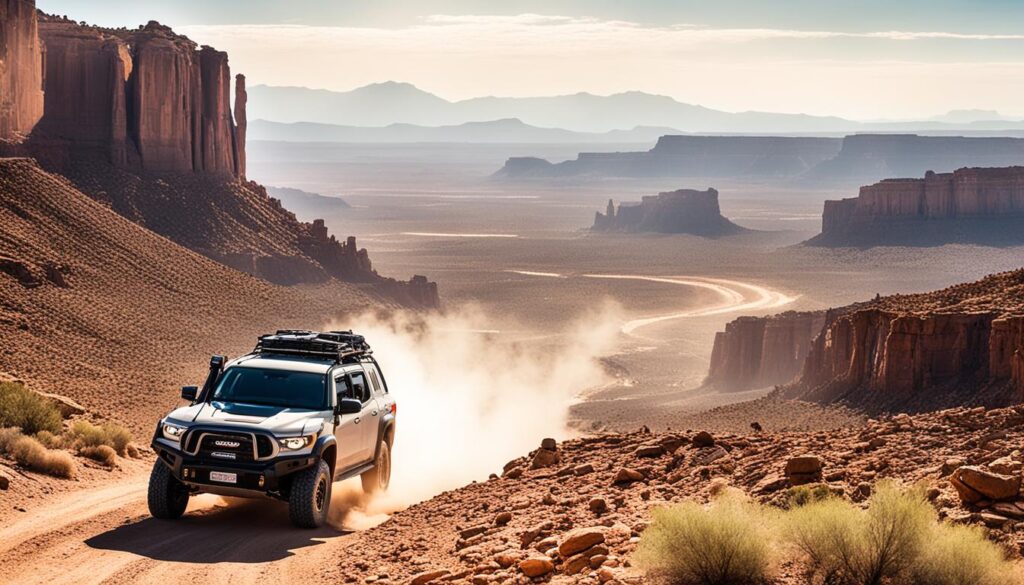
Famous Overlanding Expeditions and their Historic Trails
Throughout history, there have been numerous famous overlanding expeditions that have left their mark on the world. These brave explorers have ventured into uncharted territory, blazing trails that continue to inspire modern-day overlanders.
“The only way to discover the limits of the possible is to go beyond them into the impossible.” – Arthur C. Clarke
Some notable expeditions include:
- 1. The Trans-America Expedition led by Ben Carlin, who embarked on an audacious journey around the world by land and sea.
- 2. The Paris-Dakar Rally, an annual off-road race that tests the limits of both man and machine.
- 3. The Silk Road, a historic trade route that stretched across Asia, connecting the East and West.
Discovering Uncharted Terrain: Finding Your Path
While famous expeditions offer inspiration, part of the allure of overlanding is the opportunity to discover uncharted terrain and forge your own path. By venturing off the beaten track, you can uncover hidden gems and create unforgettable memories.
Exploring lesser-known routes not only allows you to escape the crowds, but it also offers a chance to connect with nature on a deeper level. Whether it’s camping under a star-studded sky or witnessing breathtaking sunrises over untouched landscapes, these experiences are what make overlanding truly special.
Planning Your Overlanding Itinerary: Mapping the Adventure
When planning your overlanding adventure, it’s essential to map out your itinerary carefully. Consider the duration of your trip, the difficulty level of the routes, and the availability of essential amenities along the way.
Researching the terrain, climate, and potential challenges of each route will help you make informed decisions and ensure a smooth and enjoyable journey. It’s also crucial to factor in rest days and allow for flexibility, as overlanding is about embracing the unexpected.
So, whether you aspire to conquer the vast deserts or conquer the towering peaks, overlanding offers a world of possibilities. From famous expeditions to uncharted terrain, the diverse routes available provide endless opportunities for adventure and self-discovery.
Preparing for Overlanding Challenges
Overlanding, with its spirit of adventure and exploration, presents unique challenges that require adequate preparation. Being prepared not only ensures your safety but also enhances your overall experience on the journey. Here are some key considerations to keep in mind when preparing for overlanding challenges:
- Vehicle Maintenance: Conduct regular maintenance checks on your overlanding vehicle to ensure it is in optimal condition for the journey. This includes inspecting the engine, tires, brakes, and all essential components.
- Navigation and Mapping: Plan your route and have reliable navigation tools, whether it’s GPS devices, maps, or navigation apps. Familiarize yourself with the terrain and potential obstacles you may encounter.
- Emergency Preparedness: Equip your vehicle with essential emergency supplies such as a first aid kit, fire extinguisher, spare tire, and roadside assistance tools. It is also advisable to have emergency communication devices like a satellite phone or a personal locator beacon.
- Weather Conditions: Stay informed about the weather conditions along your route. Be prepared for unexpected changes in weather and pack appropriate clothing and gear for various climates.
- Food and Water: Plan and pack sufficient food and water supplies for the duration of your overlanding journey. Consider portable cooking equipment and water purification methods to ensure access to safe and clean resources.
- Camping Gear: Choose reliable, lightweight, and durable camping gear that suits your specific needs. Invest in a quality tent, sleeping bag, cooking utensils, and camping essentials.
- Vehicle Recovery Equipment: Carry essential recovery equipment such as tow straps, recovery tracks, and a winch to handle challenging off-road situations.
- Safety Measures: Follow all safety guidelines and practice responsible behavior during your overlanding journey. Be cautious of wildlife encounters, fire safety, and respecting the environment and local regulations.
By preparing adequately for overlanding challenges, you can embark on your journey with confidence, knowing that you are equipped to overcome any obstacles that come your way.
Overlanding Culture: The Community and Lifestyle
Overlanding is not just about the adventure and exploration; it is also an opportunity to immerse oneself in a vibrant and supportive community. As overlanders traverse the wilderness, they become part of a unique culture that fosters camaraderie, shared experiences, and a deep appreciation for nature. This section delves into the rich community and lifestyle surrounding overlanding.
One of the defining aspects of overlanding culture is the strong sense of camaraderie among fellow enthusiasts. Overlanders often come together to exchange tips, share stories, and offer support. Whether it’s through online forums, social media groups, or organized events, the community serves as a valuable resource for knowledge, encouragement, and friendship.
Another integral part of overlanding culture is the emphasis on sustainable and minimal impact travel. Overlanders are committed to leaving no trace, ensuring that their presence has minimal impact on the environment. They practice responsible wilderness ethics, such as packing out waste, respecting wildlife, and adhering to designated trails.
Overlanding also embraces a unique lifestyle that is centered around self-sufficiency and simplicity. Overlanders value the freedom of being able to venture off the beaten path, relying on their skills and equipment to navigate challenging terrains and unpredictable situations. This self-reliance fosters a sense of empowerment and personal growth.
Furthermore, overlanding provides an opportunity to disconnect from the hustle and bustle of modern life and reconnect with nature. Away from the noise and distractions, overlanders find solace in the serene beauty of the wilderness, savoring the tranquility and solitude offered by their adventures.
In summary, overlanding culture encompasses a tight-knit community, a commitment to sustainability, self-sufficiency, and a desire to reconnect with nature. It is this unique culture and lifestyle that draws many individuals to embark on their overland journeys, seeking a sense of adventure, connection, and personal fulfillment.
Guidelines for Responsible Overlanding
When embarking on an overlanding adventure, it’s crucial to prioritize responsible practices that minimize our impact on the environment and local communities. As a responsible overlander, there are several key guidelines to follow:
Adhering to Leave No Trace Principles
One of the fundamental principles of responsible overlanding is leaving nature as we found it. By following the Leave No Trace (LNT) principles, we can ensure the preservation of pristine wilderness areas for future generations. The LNT principles include:
- Dispose of waste properly, including human waste, by using designated facilities or burying waste at least 6-8 inches deep and 200 feet away from water sources, campsites, and trails.
- Minimize campfire impacts by using established fire rings, using only small, dead wood, and completely extinguishing fires.
- Leave natural and cultural artifacts untouched, avoiding the temptation to take souvenirs.
- Respect wildlife by observing from a distance, not feeding them, and storing food securely to prevent attracting animals.
- Stay on designated trails to avoid damaging fragile ecosystems and vegetation.
Promoting Conservation While Overlanding
As responsible overlanders, we can actively contribute to the conservation of natural resources and habitats. Here are some ways to promote conservation:
- Practice sustainable driving techniques, such as staying on existing tracks, avoiding off-road driving in sensitive areas, and reducing speed to minimize soil erosion and habitat disturbance.
- Conserve water by using it sparingly for cooking, cleaning, and personal hygiene.
- Use eco-friendly camping gear and equipment, such as solar-powered lights and rechargeable batteries, to minimize reliance on disposable batteries and fossil fuels.
- Support local conservation organizations and initiatives dedicated to preserving the natural environment.
Engaging with Local Communities Respectfully
When overlanding in remote areas, it’s important to engage with local communities respectfully and ethically. Here are some guidelines for responsible interactions:
- Observe and respect local customs, traditions, and cultural practices.
- Seek permission before entering private or indigenous lands.
- Support local businesses and economies by purchasing goods and services from local vendors.
- Minimize noise pollution and disturbances to local communities by keeping music and noise levels low.
- Learn about the local history, culture, and environment to gain a deeper appreciation for the places we visit.
By following these guidelines, we can ensure that overlanding continues to be a sustainable and enriching way to explore the world while minimizing our impact on the environment and promoting positive cultural exchanges.
Real-life Overlanding Experiences and Stories
Real-life overlanding experiences and stories provide invaluable insights and inspiration for aspiring adventurers. These narratives showcase the true essence of overland travel, highlighting the challenges, triumphs, and unforgettable moments that come with embracing the open road.
Through personal accounts and shared anecdotes, we get a glimpse into the diverse landscapes, cultures, and encounters that overlanders encounter on their journeys. These stories not only entertain and captivate readers, but they also serve as a source of knowledge, offering practical advice and lessons learned from those who have traversed both popular and remote destinations.
Take a break from guidebooks and immerse yourself in the world of overlanding as told by those who have experienced it firsthand. Whether it’s navigating treacherous terrain, camping under the stars, or forging unforgettable connections with fellow travelers, these stories bring to life the exhilaration and fulfillment that can only be found on the road less traveled.
“Overlanding is not just about the places you visit, but the people you meet along the way. It’s about connecting with the world and discovering parts of yourself you didn’t know existed.†– Sarah Thompson
So, sit back, buckle up, and embark on a virtual journey through the real-life overlanding experiences and stories that will ignite your wanderlust and inspire you to embark on your own grand adventure.
Conclusion
Preparing for your first overland journey can be an exhilarating experience. As you embark on this adventure, it’s important to equip yourself with the knowledge and tools necessary to make the most of your overlanding experience.
Preparing for Your First Overland Journey
Before setting off on your overland journey, take the time to thoroughly plan and prepare. Research your route, familiarize yourself with the terrain, and ensure that your vehicle is in optimal condition. Packing the right gear, including essential supplies and emergency equipment, is crucial for a successful overlanding trip. Remember to pack light and efficiently utilize the limited space in your vehicle.
Additionally, it’s essential to prioritize safety during your overland adventure. Make sure you have a well-stocked survival kit and are equipped with the necessary knowledge and skills for navigating challenging situations. Always be conscious of the potential risks and be prepared to adapt to unforeseen circumstances.
Overlanding: The Merge of Adventure, Nature, and Self-Discovery
Overlanding offers a unique blend of adventure, nature, and self-discovery. It allows you to immerse yourself in untouched landscapes, connect with nature, and forge a deeper understanding of yourself. As you traverse remote trails, you’ll witness breathtaking scenery, encounter diverse wildlife, and experience the thrill of exploration.
Beyond the physical journey, overlanding provides an opportunity for personal growth and self-reflection. The solitude of the wilderness allows for introspection and a break from the distractions of modern life. It offers a chance to disconnect from the digital world and reconnect with your inner self.
Ultimately, overlanding is a transformative experience that challenges and rewards. By embracing the spirit of adventure, appreciating the beauty of nature, and embarking on a journey of self-discovery, you’ll create memories that will last a lifetime.
FAQ
What is Overlanding?
Overlanding is a form of adventure travel that involves exploring remote and off-the-beaten-path destinations in a self-reliant manner. It typically involves long-distance travel, often in a vehicle that is fully equipped and self-sufficient for camping and navigation.
What is the essence of overlanding adventure?
The essence of overlanding adventure lies in the freedom to explore the wild and immerse oneself in nature. It is about embracing the journey, connecting with the landscapes, and experiencing the thrill of venturing off-grid.
What defines the overlanding phenomenon:
Overlanding is all about self-sufficiency, self-reliance, and the desire to go beyond the ordinary. It allows adventurers to escape the confines of modern life and discover the beauty of remote and untouched places.
What is the adventurous spirit of overland travel?
The adventurous spirit of overland travel is rooted in the desire to explore and challenge oneself. Overlanders seek to push their boundaries, test their limits, and embrace the uncertainties of the journey.
How to embrace the journey beyond the horizon?
Embracing the journey beyond the horizon involves being open to new experiences, stepping out of your comfort zone, and fully immersing yourself in the present moment. It’s about embracing the unknown and letting it guide you towards exciting discoveries.
What are the historical roots of overlanding?
Overlanding has its roots in the early expeditions of pioneers and explorers who ventured into unknown territories. From the Silk Road caravans to the transcontinental explorations, overland travel has a rich history of discovery and adventure.
What is overlanding versus traditional camping?
While traditional camping often involves staying at designated campgrounds and focusing on relaxation and recreation, overlanding is a more immersive and adventurous experience. Overlanders seek to explore remote and challenging terrains, relying on their vehicles for transport and camping.
How does overlanding shift from destination to discovery?
Overlanding is not about reaching a specific destination but rather about the journey itself. It prioritizes exploration, discovery, and the thrill of venturing into uncharted territories, going beyond the conventional tourist trails.
What are some tips and tricks for the novice overlander?
Novice overlanders should start by researching and planning their route, acquiring the necessary gear and equipment, and learning essential skills such as navigation and vehicle maintenance. It’s important to start with shorter trips and gradually build up to longer and more challenging adventures.
How to select the best overlanding vehicles?
When selecting an overlanding vehicle, factors such as reliability, off-road capability, cargo capacity, and fuel efficiency should be considered. Popular choices include rugged SUVs, pickup trucks, and modified 4×4 vehicles that can handle various terrains and provide sufficient living space.
What is the essential overlanding gear for every explorer?
Essential overlanding gear includes camping equipment, cooking supplies, navigation tools, first aid kits, recovery gear, communication devices, and emergency provisions. It’s important to pack efficiently, prioritize necessary items, and adapt the gear to the specific trip and climate.
How to navigate gear selection: what’s necessary vs. what’s not?
Choosing the right gear for overlanding requires careful consideration of the trip’s duration, location, and expected conditions. Quality and durability are crucial, but it’s also important to avoid overpacking and prioritize items that serve multiple purposes.
How to efficiently utilize vehicle space while packing?
Utilizing vehicle space efficiently involves using storage solutions such as roof racks, drawers, and cargo systems. Packing items in waterproof and stackable containers can maximize space and ensure easy access to essential gear.
What are survival kits and emergency preparedness?
Survival kits and emergency preparedness involve carrying essential items for unforeseen situations, such as extra food and water, fire-starting tools, a reliable communication device, a comprehensive first aid kit, and knowledge of basic wilderness survival skills.
What are diverse overlanding routes: from deserts to mountain ranges?
Overlanding provides endless opportunities to explore diverse landscapes, from vast deserts to towering mountain ranges. Popular routes include the Silk Road, the Pan-American Highway, the Australian Outback, and the Trans-Siberian Railway, among many others.
What are famous overlanding expeditions and their historic trails?
Famous overlanding expeditions include the Dakar Rally, the Paris-Dakar Rally, and the Camel Trophy. These expeditions have left behind a legacy of challenging routes and historic trails that continue to inspire modern-day overlanders.
How to discover uncharted terrain and find your path?
Discovering uncharted terrain involves research, navigation tools, and a sense of adventure. Exploring lesser-known routes and backcountry areas can lead to remarkable discoveries and unexpected natural beauty.
How to plan your overlanding itinerary and map the adventure?
Planning an overlanding itinerary involves considering factors such as duration, distance, fuel availability, camping spots, and points of interest. It’s important to balance flexibility with structure and allow room for unexpected detours or changes in the route.
How to prepare for overlanding challenges?
Preparation for overlanding challenges includes acquiring the necessary skills, knowledge, and equipment. This includes learning basic vehicle maintenance, navigation, and survival skills, as well as having a comprehensive plan for emergencies or unexpected situations.
What is overlanding culture: the community and lifestyle?
Overlanding culture revolves around a vibrant and supportive community of like-minded adventurers. It fosters a sense of camaraderie, sharing experiences, and knowledge, as well as a deep respect for nature and the environments we explore.
What are the guidelines for responsible overlanding?
Responsible overlanding involves adhering to Leave No Trace principles, promoting conservation, and engaging with local communities respectfully. It’s crucial to minimize our impact on the environment, preserve natural resources, and leave destinations better than we found them.
How to adhere to Leave No Trace principles?
Adhering to Leave No Trace principles includes minimizing campfire impacts, packing out trash, respecting wildlife and their habitats, and staying on designated trails. It’s about leaving nature in the same or better condition than we found it, ensuring its preservation for future generations.
How to promote conservation while overlanding?
Promoting conservation while overlanding involves supporting local environmental initiatives, minimizing our carbon footprint, and making sustainable choices during our journeys. It’s about being conscious of the impact we have on the natural world and taking steps to mitigate it.
How to engage with local communities respectfully while overlanding?
Engaging with local communities respectfully involves learning about their customs, traditions, and sensitivities, and respecting their land and property. It’s important to be mindful of cultural differences, support local businesses, and contribute positively to the communities we encounter.
What are real-life overlanding experiences and stories?
Real-life overlanding experiences and stories offer insights into the challenges, triumphs, and transformative moments that overlanders encounter. These firsthand accounts provide inspiration, practical tips, and a glimpse into the joys and struggles of life on the road.
How can I prepare for my first overland journey?
To prepare for your first overland journey, start by researching destinations, acquiring necessary skills and equipment, and planning your route and itinerary. Build your confidence through shorter trips and gradually expand your adventures as you gain experience.
What is the merge of adventure, nature, and self-discovery that overlanding offers?
Overlanding merges adventure, nature, and self-discovery, providing a unique opportunity to explore breathtaking landscapes, challenge oneself, and delve into introspection. It offers a space to connect with nature, find inner strength, and cultivate a deep appreciation for the wonders of the world.
